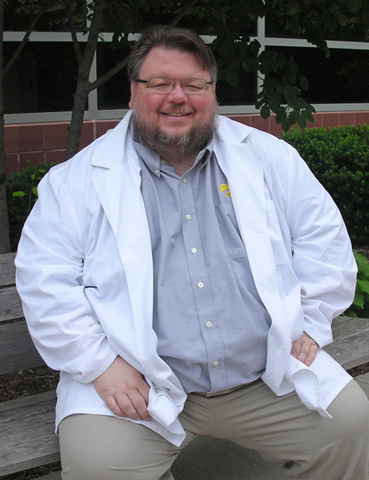 What is your hometown?
What is your hometown?

I was born in Seymour, Indiana but was raised Hendersonville, Tennessee and identify both of them as well as North Liberty, Iowa as my hometowns.
How/when did you become interested in science and/or medicine?
I have always been fascinated with science but that really took hold when I was given the opportunity to attend the Tennessee Governor’s School for the Sciences during the summer after my junior year of high school.
When did you join the University of Iowa faculty?
September of 2004
How or why did you choose to join the faculty at the University of Iowa?
Several things really stood out.
- This is an incredibly supportive place where cutting edge science can be done.
- The impressive collection of immunology and infectious disease-based faculty.
- The collaborative nature of the scientists and science here at Iowa.
Is there a teacher or mentor who helped shape your career?
I have had several critical mentors throughout my life. My family and teachers in high school and undergraduate education supported and encouraged me to pursue science. Specifically, in my career as an academic scientist I would say my PhD mentor, Habib Zaghouani. He taught me how to critically think and how to examine a problem from all angles.
How do you see your faculty role impacting medicine and/or science?
I think my role has several facets, including training the next batch of critical thinkers and leaders in the field of immunology, both within my research group but also the larger University, and undertaking cutting edge research for the betterment of human health.
What is the biggest change you've experienced in your field since you were a student?
Immunology is a relatively young discipline. There has been a massive expansion in our understanding of the cells and processes involved in immunity. For instance, since my time as a student the number of types of dendritic cells has changed from 2-3 total to 6+ types in many tissues. Furthermore, we now understand that the dendritic cells found in each tissue while related are distinct.
What one piece of advice would you give to today's students?
When the going gets tough in your experiments or life, I have found that the answer is to put in additional effort. Some of the biggest and most satisfying breakthroughs I have been a part of in my career have been in projects where the system or experiments did not initially behave as predicted.
In what ways are you engaged in professional activities outside the University (i.e. population based research, mentoring high school students, sharing your leadership/ expertise with organizations or causes, speaking engagement off campus, etc.)?
I typically participate in several NIH study sections each year and enjoy giving talks on my science at outside organizations/institutions. I am additionally currently part of the organizers for the Autumn Immunology Conference which is held each November in Chicago.
What are some of your outside (personal) interests?
Travel and fly fishing.
Learn more about Kevin Legge, PhD.